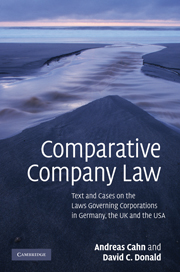 Comparative Company Law
Comparative Company Law Book contents
- Frontmatter
- Contents
- List of figures
- List of tables
- Preface and acknowledgments
- Glossary
- List of abbreviations
- Table of cases
- Table of legislation
- PART I The essential qualities of the corporation
- PART II The corporation and its capital
- PART III Governing the corporation
- SUBPART A The management
- 10 An introduction to the board and its governance
- 11 Directors' power to represent the company
- 12 Directors' duties of loyalty, good faith and care
- 13 Judicial review of management decisions (the business judgment rule)
- 14 Executive compensation
- 15 Directors' duties in listed companies
- SUBPART B The members
- PART IV Corporate combinations, groups and takeovers
- References
- Index
13 - Judicial review of management decisions (the business judgment rule)
from SUBPART A - The management
- Frontmatter
- Contents
- List of figures
- List of tables
- Preface and acknowledgments
- Glossary
- List of abbreviations
- Table of cases
- Table of legislation
- PART I The essential qualities of the corporation
- PART II The corporation and its capital
- PART III Governing the corporation
- SUBPART A The management
- 10 An introduction to the board and its governance
- 11 Directors' power to represent the company
- 12 Directors' duties of loyalty, good faith and care
- 13 Judicial review of management decisions (the business judgment rule)
- 14 Executive compensation
- 15 Directors' duties in listed companies
- SUBPART B The members
- PART IV Corporate combinations, groups and takeovers
- References
- Index
Summary
Required reading
D: AktG, §§ 93, 116
UK: CA 2006, secs. 170, 172, 173–174
US: DGCL, §§ 143, 144; Model Act, §§ 8.30–8.31
Judging business judgment
Operation under central management is a core characteristic of the corporation. Management authority is delegated to a board of directors and other executive officers who control the aggregated assets of the corporation because it is expected that full-time, professional managers can operate the company more successfully than can the shareholders. In the course of managing the company, these expert directors make decisions to determine the course of the company's business operations. As discussed in Chapter 12, under the company laws of the UK, Germany and the US, directors must fulfill duties of care, skill and diligence, which, while not identical to those imposed on other fiduciaries like agents and trustees, are quite similar. Take, for example, the Companies Act 2006, which formulates the duty of care as follows:
A director of a company must exercise … the care, skill and diligence that would be exercised by a reasonably diligent person with … the general knowledge, skill and experience that may reasonably be expected of a person carrying out [such] functions … and … the general knowledge, skill and experience that the director has.
In an ordinary negligence action under a standard of this type outside of the corporate context, a court could be expected to hear evidence from an expert witness as to whether the defendant in fact showed the “knowledge, skill and experience” required to meet the objective standard of care plus any special (subjective) skills held.
- Type
- Chapter
- Information
- Comparative Company LawText and Cases on the Laws Governing Corporations in Germany, the UK and the USA, pp. 369 - 415Publisher: Cambridge University PressPrint publication year: 2010


